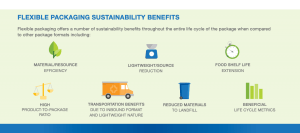Many brands and consumers focus on recyclability or PCR (Post Consumer Resin) packaging for sustainable packaging solutions. Recyclability is an essential aspect of sustainability, but it is just one of many solutions. It is crucial to understand how each packaging life cycle impacts the environment and ecological footprint.
Many types of rigid packaging are recyclable, but high material consumptions offset the benefits of recyclability. On the other hand, flexible packaging reduces impacts throughout the packaging life cycle, including manufacturing, transportation, storage, and end-of-life disposal.

Source: Flexible Packaging Association (FPA), A HOLISTIC VIEW OF THE ROLE OF FLEXIBLE PACKAGING IN A SUSTAINABLE WORLD
Manufacturing
Flexible packaging uses up to 90% fewer manufacturing resources than rigid packaging, significantly improving the environmental footprint. In the ‘90s, ZACROS introduced a unique refill flexible pouch in Japanese personal and home care products. Now the retail space is close to 80% refill flexible pouches in Japan. While the demand for personal and home care products has doubled in the last 20 years, plastic consumption has decreased by 42%.
Transportation and Storage
Lightweight reduces fuel consumption and emissions by optimizing efficiency during transportation. Unfilled glass jars use 26 truckloads compared to unfilled flexible pouches, which use only one truckload to transport an equal amount of product.1
End-of-Life Disposal
According to the EPA, the 2017 recycling rate in the US was only 35.2%.2 While many countries are trying to improve their waste management infrastructures, flexible packaging is a viable solution for reducing the amount of plastic wastes go to landfills.
Flexible packaging has its challenge for recyclability due to its multi-layer construction. However, more and more monomaterial flexible packaging has been developed worldwide. And there are programs like TerraCycle Free Recycling Programs which collaborate with brands to offer a solution for hard-to-recycle packaging.
Future of Flexible Packaging
Many brands are taking a more significant initiative toward sustainability. There are many misconceptions about plastic packaging because consumer focus is still on the end-of-life-disposal. Flexible packaging offers sustainability benefits throughout its life cycle, and as the flexible packaging industry continues to evolve, there needs to be more education about its value and advantages.
Sustainable Packaging Solutions with ZACROS
ZACROS offers customized flexible packaging, including monomaterial CUBITAINER® and flexible pouch. We reinvent products. Together, we can make differences. To learn more about liquid packaging comparison, download the Choosing Right Liquid Packaging today.
1. Flexible Packaging Association
2. EPA, Facts and Figures about Materials, Waste and Recycling